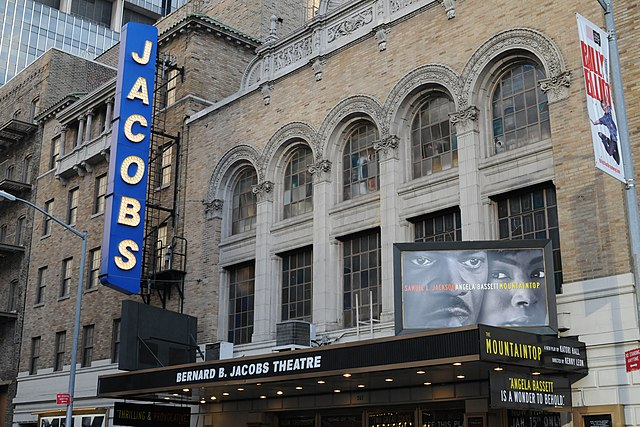Editorial | The neo-Nazi protest at ‘Parade’ has far-reaching consequences
The Bernard B Jacobs Theatre on Broadway; 242 West 45th Street.
February 23, 2023
Neo-Nazi protesters stood outside the Broadway musical “Parade” on Tuesday, chanting and passing out fake information on pamphlets about the play’s protagonist. “Parade” is loosely based on the story of Leo Frank, a Jewish factory worker falsely accused of killing a 13-year-old factory worker and lynched by an angry mob in 1913.
The neo-Nazi group relied on centuries-old antisemitic tropes about Leo Frank, including that he was a pedophile, and spread misinformation and hate. Antisemitic rhetoric is never okay, and this group’s response to the play shows just how important it is to tell stories like this to stop the spread of hatred. The continual rise in antisemitic and hateful language is extremely dangerous, and these protests will have far-reaching consequences, continuing to fuel the fire of hate.
Leo Frank’s murder was based on false accusations and a mob mentality — themes that the musical tackles. The group protesting the show also leaned on these tactics to try and scare away patrons and continue to spread false information about Frank nearly 100 years after his death. Frank’s death led to the creation of the Anti-Defamation League, a Jewish organization to stop antisemitism, and a revival of the Ku Klux Klan. The group that protested “Parade” has ties to the KKK. This is why it is important nearly a century later that these stories are told and that we recognize that hatred from neo-Nazi groups can have far-reaching consequences.
Antisemitism has already become an increasingly pressing issue. 43% of Jewish people in America believe that antisemitism is a very serious issue and hate crimes against Jewish people have reached an all-time high. These neo-Nazi protesters are not just spreading false information — this false information is leading to tangible action against Jewish people. From vandalism of synagogues to violent attacks against Jewish people, antisemitism is not just a thing of Leo Frank’s time — it is here and it is dangerous.
Rhetoric is not just words and the Leo Frank case proves just that. The jury of his case was partial, believing in antisemitic tropes pushed by the media. This rhetoric influenced the town so much that Frank was kidnapped from jail by an angry mob and lynched. The neo-Nazi group proved this — mob mentality leads to dangerous attacks and violence and this was not simply a protest but a threat. The rhetoric often used by this group has become violent with members of the neo-Nazi group inciting violence at the Unite the Right protests in Charlottesville. These are not just words to condemn — this is inciting violence.
The producers and stars of the musical quickly condemned the actions of the group, as did the Actors’ Equity Association, and rightfully so. Not only is it scary to patrons of this show to hear disgusting and hateful rhetoric as they walk into a musical, but it can have much scarier implications for the actors. If any musical or play is objected to by neo-Nazis or other hateful groups because of its content, this sets a dangerous precedent for the arts. Will actors and playwrights have to censor themselves in fear? Unfortunately, the incident at “Parade” seems like it could happen again.



